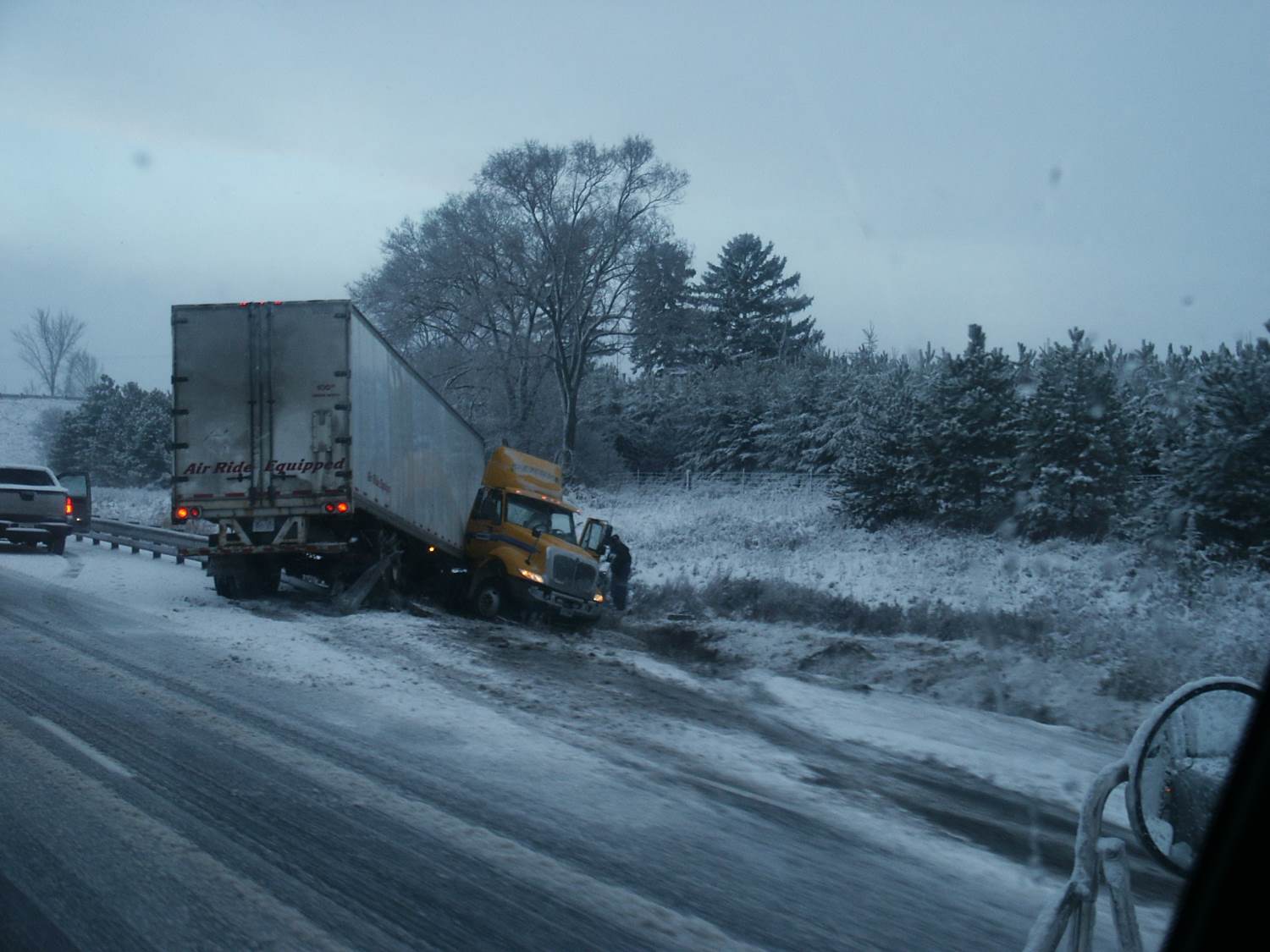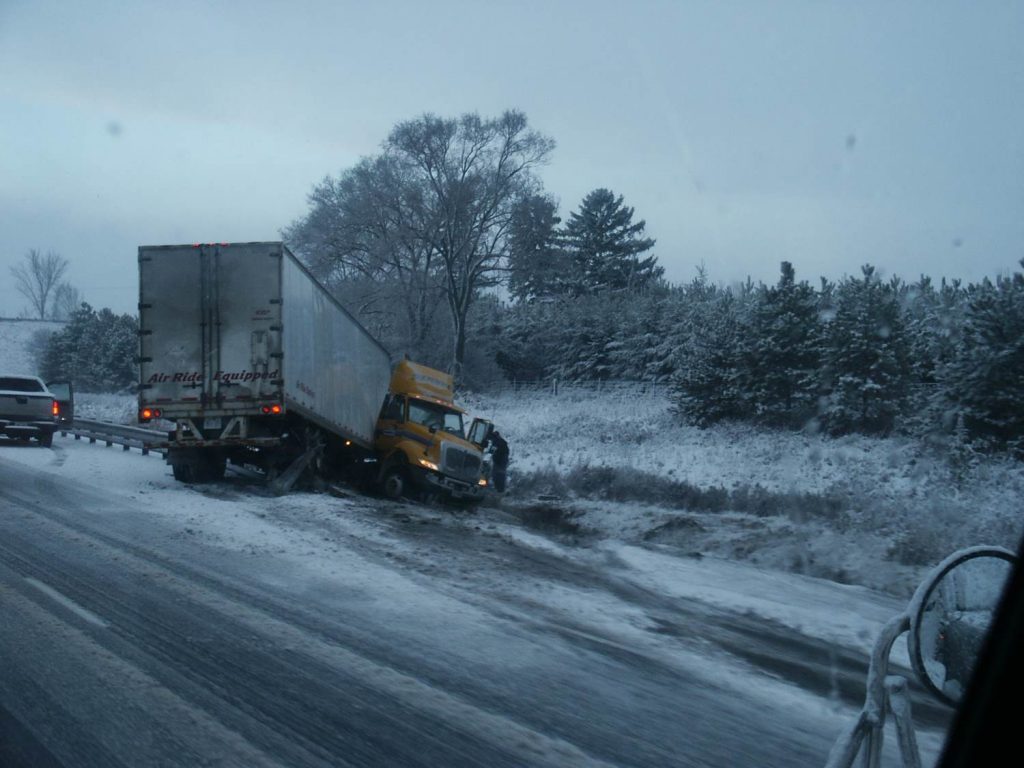- Free Consultation: (630) 527-4177 Tap Here to Call Us
Semi-Truck Jackknife Accidents in Wet Conditions

Semi-truck accidents are some of the most dangerous incidents on the road, often resulting in catastrophic injuries, fatalities, and extensive damage. One of the most alarming types of accidents involving large trucks is a jackknife accident, where the truck’s trailer swings out to the side, forming an angle with the cab like a folding pocketknife. These accidents are particularly common in wet or slippery conditions, where truck drivers struggle to maintain control of their vehicles due to decreased traction on the road.
From our Illinois personal injury firm’s point of view, understanding the causes of jackknife accidents, especially in wet weather, is critical to helping victims recover the compensation they deserve. Semi-truck drivers and their employers have a responsibility to ensure that these massive vehicles are operated safely under all road conditions. When they fail in this duty, the consequences can be life-altering for those involved.
What is a Jackknife Accident?
A jackknife accident occurs when the cab of a truck and its attached trailer fold in on each other, resembling the shape of a jackknife. This happens when the drive axle brakes on the tractor lock up, causing the trailer to continue moving forward while the cab slows down or stops. The momentum of the trailer can cause it to swing out, often blocking multiple lanes of traffic and resulting in severe multi-vehicle accidents.
Jackknife accidents are often a result of improper braking techniques, driver error, or poor road conditions. When the roadway is wet, the risk of jackknifing increases significantly, as traction between the truck’s tires and the road surface is reduced, making it harder for drivers to control the vehicle in emergency braking situations.
Why Jackknife Accidents are Common in Wet Conditions
Wet conditions create a perfect storm for jackknife accidents due to several factors:

- Decreased Traction: In wet or icy conditions, truck tires lose traction on the road, making it harder for drivers to stop or slow down. When the truck’s cab brakes faster than the trailer, the trailer can lose control and swing out.
- Longer Stopping Distances: Trucks already require significantly more stopping distance than smaller vehicles. According to the National Highway Traffic Safety Administration (NHTSA), a fully loaded semi-truck can take up to 40% longer to stop than a passenger car. In wet conditions, this stopping distance increases even further, exacerbating the likelihood of jackknifing.
- Improper Braking Techniques: Truck drivers are trained to brake in a controlled manner to prevent skidding or jackknifing. However, in adverse weather conditions, sudden or excessive braking can cause the trailer to slide, leading to a jackknife.
- Driver Fatigue and Error: Drivers of commercial vehicles often face long hours behind the wheel. When drivers are fatigued, their reaction times slow, and they may be more prone to making mistakes, such as over-braking in wet conditions.
- Improper Maintenance: Tires, brakes, and other mechanical components of a truck need to be in good condition to operate safely in adverse weather. Poor maintenance, such as worn-out tires or faulty brakes, increases the risk of jackknife accidents, especially in slippery conditions.
Legal Implications of Jackknife Accidents
From a legal perspective, jackknife accidents are often preventable and can frequently be attributed to negligence on the part of the truck driver, the trucking company, or other parties involved in the truck’s operation. Our Illinois semi-truck accident firm handles cases involving jackknife accidents with a focus on identifying the root causes and holding the responsible parties accountable.
Key areas of negligence we investigate include:
- Driver Error: If the truck driver failed to exercise proper caution in wet conditions, such as by speeding or using improper braking techniques, they may be found liable for the accident.
- Inadequate Training: Trucking companies have a responsibility to ensure their drivers are properly trained, particularly when it comes to operating large vehicles in adverse weather conditions. Inadequate training on how to safely brake or handle a semi-truck in wet conditions could lead to liability.
- Vehicle Maintenance: Commercial vehicles are subject to strict maintenance standards under federal law. If a jackknife accident occurred because of faulty brakes, worn tires, or other mechanical failures, the trucking company could be held responsible for failing to properly maintain the vehicle.
- Employer Negligence: Trucking companies are also responsible for ensuring that drivers comply with hours of service (HOS) regulations to prevent driver fatigue. Violations of these regulations often contribute to accidents and could be a factor in jackknife accidents as well.
How We Help Victims of Jackknife Accidents
At John J. Malm & Associates, we have extensive experience handling Illinois truck accident cases, including those involving jackknife accidents. Our team of DuPage County personal injury lawyers works diligently to investigate the circumstances of the accident and identify all liable parties. In many cases, multiple parties may share responsibility, from the truck driver to the company that employs them and the maintenance teams that service the vehicle.
We help victims pursue compensation for a variety of damages, including:
- Medical Expenses: Semi-truck accidents often result in catastrophic injuries such as traumatic brain injuries, spinal cord injuries, and broken bones. We work to ensure that all past and future medical costs are covered.
- Pain and Suffering: Physical pain, emotional distress, and diminished quality of life are common after a severe truck accident. We help our clients pursue compensation for the full extent of these damages.
- Lost Wages: When injuries from a jackknife accident prevent victims from returning to work, we help them recover compensation for lost income, both now and in the future.
- Rehabilitation and Long-Term Care: Some injuries require extensive rehabilitation or lifelong care. We work with medical experts to ensure that victims receive compensation to cover these costs.
Preventing Jackknife Accidents: What Trucking Companies Should Do
Trucking companies can take steps to reduce the risk of jackknife accidents, particularly in wet conditions, by implementing several safety measures:
- Regular Vehicle Maintenance: Ensuring that tires, brakes, and other mechanical systems are in good working order is essential to preventing accidents. Routine inspections are required under FMCSA regulations to ensure that trucks are safe to operate.
- Driver Training: Proper training on how to handle a semi-truck in adverse weather conditions, including proper braking techniques, is critical. Trucking companies should ensure that drivers are regularly trained and updated on safety protocols.
- Enforcing Hours of Service: Compliance with HOS regulations is critical to preventing driver fatigue. Trucking companies must monitor drivers’ hours to ensure they are not driving while tired, which can significantly impact their ability to handle the vehicle safely in wet conditions.
- Adjusting Schedules: Trucking companies should take weather conditions into account when scheduling deliveries. If bad weather is expected, it may be safer to delay shipments to avoid the increased risks posed by wet or icy roads.
John J. Malm & Associates: Protecting Your Rights After a Jackknife Accident
If you or a loved one has been injured in a jackknife accident involving a semi-truck, it’s important to consult with an experienced Illinois truck accident attorney who understands the complexities of truck accident litigation. At John J. Malm & Associates, we have a proven track record of holding negligent truck drivers and their employers accountable for the injuries and damages they cause. Our team will work tirelessly to ensure you receive the full compensation you are entitled to under the law.
If you have been involved in a semi-truck accident, particularly in wet conditions, contact us today for a free consultation. We have offices in Naperville and St. Charles, and we are ready to help you pursue justice.















